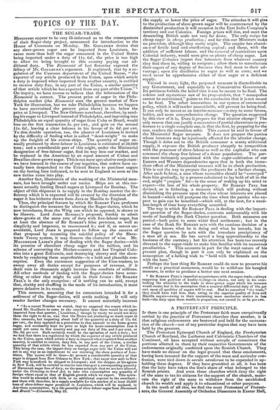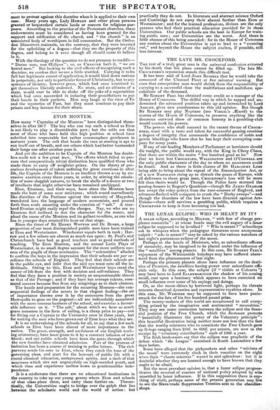A PROTESTANT PRINCIPLE.
IF there is one principle of the Protestant faith more unequivocally settled by the practice of Protestant churches than another, it is that religious endowments are bestowed and held for the austenta- lion of the church—not of any particular dogma that may have been held by the granters.
The Protestant Episcopal Church of England, the Presbyterian Church of Scotland, the Lutheran and Calvinistic Churches of the Continent, all have accepted without scruple of conscience the portions allotted to them by their respective Governments of the endowments originally conferred upon the Romish Church. They have made no demur on the legal ground that these emoluments, having been invested for the support of the mass and auricular con- fession, were tied down in sacula saculorum to be expended in up- holding these dogmas. If they have grumbled at all, it has been that the laity have taken the lion's share of what belonged to .the Romish priests. And even those churches which deny the right of the state to tax its citizens for the support of the church, main- tain the right of the state to withdraw from the established church its wealth and apply it to educational or other purposes. In the teeth of all this, we find the most Protestant of Protest- ants, the General Assembly of Orthodox Dissenters in Exeter Hall, meet to protest against this doctrine when it is applied to their own ease. Many years ago, Lady HEWLEY and other pious persons granted or bequeathed certain lands or manors for religious pur- poses. According to the practice of the Protestant churches, these endowments must be considered as having been granted for the support and edification of the church, and " the church" is an associated body of worshipers in full communion. But the Ortho- dox Dissenters maintain, on the contrary, that they were invested for the upholding of a dogma—that they are the property of this dogma, and belong to it even though all should cease to believe in it.
With the theology of the question we do not presume to meddle- " Davos sum, non CEdipus" ; or, as CHAUCER bath it, " we are horse' men." But looking to the civil effects of recognizing such a doctrine, we confess that we are a little startled. Carrying it to its full but legitimate extent of application, it would bind down nations in perpetuity, not only to particular forms of Christianity, but to any systems of idolatry, however gross, which had once contrived to get themselves liberally endowed. No state, and no citizens of a state, would ever be able to shake off the yoke of a superstition which had once succeeded in inducing their grandfathers to put their hands in their pockets. Men may laugh at the rites of Fo and the mysteries of Fum, but they must continue to pay their priests and buy incense for their altars.



























 Previous page
Previous page